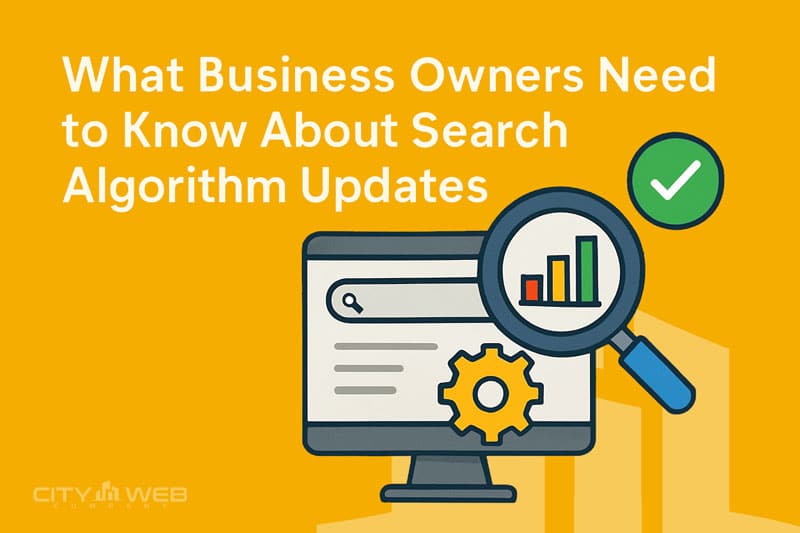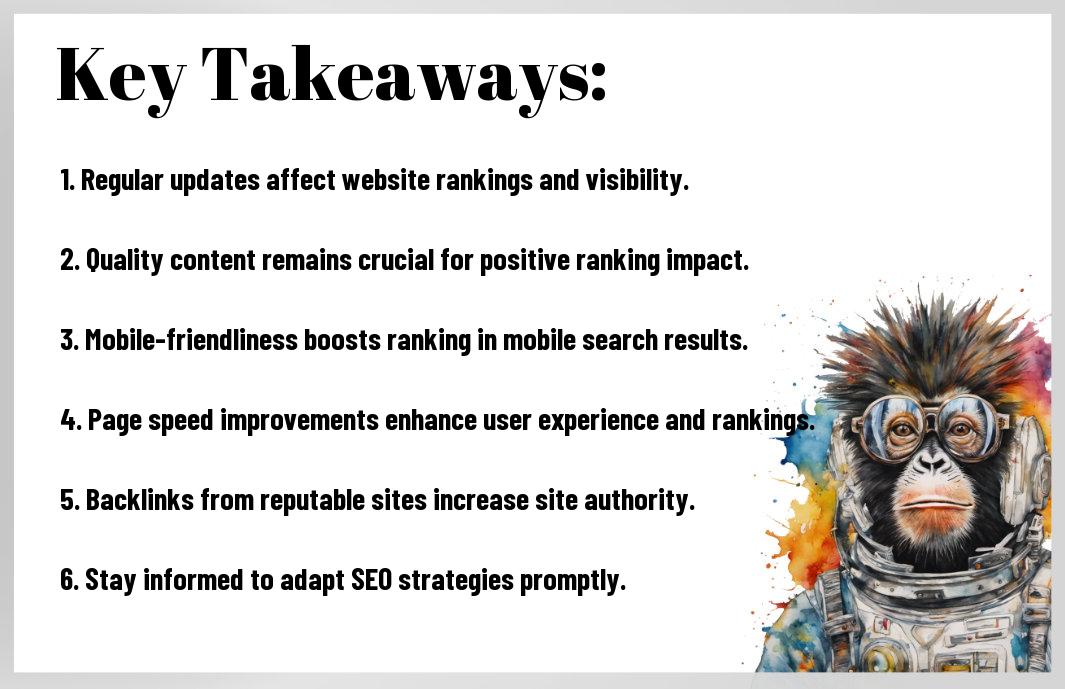Explore the online advertising guide 2026 for local businesses. Follow step-by-step strategies to build, launch, and optimize campaigns that drive real results.

What Business Owners Need to Know About Google’s Algorithm Updates
Just as the digital landscape evolves, so does Google’s algorithm, directly impacting your online visibility. Understanding these updates is vital because failure to adapt can lead to a drop in your website’s rankings, affecting your customer reach. By keeping informed on the latest Essential Google Algorithm Updates for Small Business Owners, you can enhance your digital strategy and potentially boost your traffic and sales. Stay ahead of the competition by mastering how these changes affect your business.
Table of Contents
Key Takeaways:
- Google’s algorithm updates are frequent and can significantly impact website rankings and visibility.
- Staying informed about the types of updates, such as core and specific feature updates, helps in adapting strategies effectively.
- Quality content remains a priority, with an emphasis on relevance, user engagement, and expertise in the subject matter.
- Site performance factors, including loading speed, mobile-friendliness, and user experience, are increasingly influential in search rankings.
- Monitoring analytic tools and search engine results can provide valuable insights into how updates affect traffic and rankings.
Decoding the Impact of Algorithm Changes on Search Rankings
Algorithm updates often lead to dramatic shifts in search rankings, affecting how your website is perceived and ranked by Google. Even minor adjustments can have a ripple effect, reshuffling the competitive landscape and altering traffic patterns. Being proactive rather than reactive is key to maintaining your visibility. Understanding how these updates function will help you adapt your SEO strategy effectively, safeguarding your online presence.
How Google’s Algorithm Determines Authority and Relevance
Google’s algorithm assesses authority and relevance through various factors, including backlinks, content quality, and user engagement metrics. Your site’s overall expertise in your niche is evaluated, ensuring that users receive the most accurate and helpful information. This multidimensional approach ensures that only the most credible sources rank highly, making it important for you to invest in quality content that resonates with your audience.
Real-World Implications of Frequent Updates
Frequent algorithm updates can lead to fluctuating traffic levels, impacting your potential revenue and overall business strategy. One moment your site may occupy a top position, and the next, it could drop significantly, forcing you to continuously adapt. For instance, a 2021 update incentivized sites with enhanced user experiences, which left many businesses scrambling to enhance their websites to stay competitive.
These shifts not only affect visibility but also your marketing budget, as you may find yourself allocating more resources towards SEO optimization and adjustments. For example, sites that previously captured a steady audience might see drops in click-through rates, resulting in decreased leads and sales opportunities. Keeping up with algorithm changes means continuously understanding your audience’s needs and adjusting your strategies accordingly. Adapting to these updates promptly can lead you to greater resilience in an ever-evolving digital landscape.
Navigating Algorithm Shifts: Strategies for Business Owners
Staying ahead of Google’s algorithm changes isn’t just about understanding the updates but actively adapting your strategies to mitigate their impact. Implement a combination of monitoring tools and analytics to track your website’s performance post-update. Engaging with reputable SEO resources can further help you stay informed, such as What are Google algorithm updates? What SEOs need … that break down the nuances of these changes.
Proactive Methods to Adapt Your SEO Tactics
Developing a flexible SEO approach allows you to adjust your tactics in real time. Regularly audit your website’s performance, analyzing which keywords are losing traction and adapting your content accordingly. Invest in tools that can provide insights into traffic patterns and user engagement. By staying anticipatory instead of reactive, you can better position your business to respond to future updates.
Developing a Robust Content Strategy for Sustainability
Creating a sustainable content strategy involves focusing on quality over quantity. By prioritizing well-researched, high-quality content that directly meets the needs of your target audience, you set a solid foundation. Use data-driven insights to identify trending topics and optimize your content for relevant keywords. Regularly update existing articles, ensuring they remain accurate and useful, which encourages both user engagement and favorable search rankings.
A robust content strategy not only attracts traffic but also builds authority in your niche. By consistently delivering value, your audience will perceive your content as reliable, which can enhance your brand reputation. Incorporate multimedia elements like videos or infographics to cater to varied preferences, and always optimize for SEO best practices. This multifaceted approach fosters long-term sustainability in content delivery and helps buffer against future algorithm shifts, ensuring your business remains relevant in search results.
Common Missteps: What to Avoid After an Update
Avoiding missteps post-update can significantly influence your recovery speed and ranking stability. Many business owners immediately overhaul their entire website or content strategy, which can lead to more confusion and potential penalties. Instead, assess the implications of the update and focus on gradual adjustments based on data-driven insights. Ensure any changes align with your audience’s needs and Google’s evolving standards—this measured approach can yield more sustainable results and ease your transition.
Diverging from Best Practices: The Risks
Straying from established best practices offers significant risks that can lead to visibility loss and reduced traffic. Implementing black-hat SEO tactics, keyword stuffing, or duplicating content may yield short-term gains, but can ultimately result in penalties that are difficult to reverse. By adhering to Google’s guidelines and focusing on user experience, you maintain the integrity and reputation of your brand in the long run.
Ignoring Data: The Cost of Neglecting Analytics
Neglecting to analyze critical performance data can result in missed opportunities and uninformed decisions. Without proper monitoring, it becomes almost impossible to assess the effectiveness of your adjustments after an update. In fact, businesses that fail to interpret their data are less likely to recover fully from algorithm changes, often losing 30% or more of their organic traffic. Leveraging tools like Google Analytics and Search Console can provide valuable insights into how users interact with your site and reveal areas needing improvement.
To fully capitalize on your analytics, focus on key performance indicators such as page views, bounce rates, and conversion rates. Setting up regular audits of your data will allow you to spot trends and adapt quickly if your metrics are declining. Companies that prioritize analytics are more equipped to make informed changes and develop strategies that align with the latest updates, ultimately narrowing the gap between immediate fallout and long-term SEO success. Being data-driven means you can make proactive decisions, avoiding unnecessary risks and ensuring your digital presence remains strong.
The Future of Search: Preparing for Continuous Change
Preparing for ongoing fluctuations in search algorithms requires a proactive mindset. As Google evolves, shifting trends and user behaviors continuously mold the digital landscape. Developing a strategy that accommodates flexibility will become necessary for businesses aiming to maintain their online visibility and relevance amidst these constant changes.
AI and Machine Learning: Shaping Tomorrow’s Algorithms
AI and machine learning technologies are driving the transformation of search algorithms, enhancing their ability to deliver personalized and contextually relevant results. With each update, Google’s algorithms leverage vast data sets to better understand user intent, making it imperative for your content strategies to align with these advancements. Implementing AI tools can provide insights into user behavior, allowing you to optimize for the next stage of search.
Emerging Trends Every Business Owner Should Watch
Emerging trends in search are pivotal for staying competitive in the digital landscape. Voice search is gaining momentum, with an estimated 55% of households expected to own smart speakers by 2025. Video content also continues to skyrocket in importance, as more consumers favor visual information over text. Adapting your marketing strategies to incorporate these trends will be crucial in getting ahead of the curve.
Paying attention to evolving user preferences and technological innovations will set you apart from your competitors. For instance, optimizing for voice search requires a shift towards more conversational keywords and phrases. Likewise, investing in engaging video content can capture attention more effectively than traditional textual formats. Implementing structured data allows search engines to better interpret your content and serve it to the right audience, ultimately enhancing your ranking potential. Staying informed about these trends is vital for your long-term success in the digital realm.

To wrap up
Taking this into account, it’s vital that you stay informed about Google’s algorithm updates to effectively optimize your website and maintain your online visibility. Regularly reviewing your SEO strategies and adapting to changes will help ensure that your content aligns with search intent and best practices. By prioritizing user experience and delivering high-quality, relevant information, you can navigate these updates confidently and continue to grow your business online.
FAQ
Q: What are Google’s algorithm updates and why are they important for business owners?
A: Google’s algorithm updates are changes to the search engine’s ranking system that determine how web pages are ranked in search results. These updates aim to improve the quality and relevance of the results offered to users. For business owners, understanding these updates is necessary as they can significantly impact website visibility, organic traffic, and ultimately, revenue. Staying informed helps businesses adapt their SEO strategies effectively and maintain their search rankings.
Q: How can business owners stay informed about Google’s algorithm updates?
A: Business owners can stay informed by following reputable SEO blogs, forums, and Google’s own announcements. Websites like Search Engine Journal and Moz frequently publish articles on new updates. Additionally, Google provides resources like the Google Search Central Blog, which outlines best practices and updates directly from the source. Engaging in SEO communities on platforms like Reddit or LinkedIn can also offer valuable insights and discussions about the latest changes.
Q: What are some common types of algorithm updates that business owners should be aware of?
A: Business owners should be aware of several types of algorithm updates, including Core Web Vitals updates which focus on page user experience; Mobile-First indexing updates that prioritize mobile-friendly sites; and content quality updates aimed at improving the relevance and authenticity of content. Other significant updates include the Panda update, which targets low-quality content, and the Penguin update, which addresses link quality. Understanding these types helps in optimizing web strategies to align with Google’s priorities.
Q: What actions can business owners take to mitigate the impact of algorithm updates?
A: Business owners can take several actions to mitigate the impact of algorithm updates, such as ensuring their website is mobile-friendly, improving page loading speeds, and producing high-quality, relevant content. Regularly auditing the website for technical SEO issues, optimizing for user experience, and building a diverse and natural backlink profile are also beneficial practices. Engaging in continuous learning about SEO trends and having a flexible strategy can further help absorb changes without significant disruptions.
Q: How can business owners measure the impact of Google’s algorithm updates on their website?
A: Business owners can measure the impact by monitoring key performance indicators such as organic traffic, search rankings, and conversion rates before and after an update. Using tools like Google Analytics and Google Search Console can provide valuable insights into site performance and visibility. Tracking fluctuations in keyword rankings and using website audit tools can also indicate how well the site has adapted to recent updates. Regularly reviewing these metrics helps businesses assess the effectiveness of their strategies in response to algorithm changes.



